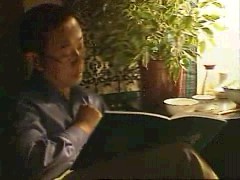Catching a thief
|

|
|
Chinese
校园警察
A:老王,饭好了!老王,吃饭啦,你看什么呢?
A:被一本杂志给吸引住啦?有什么好看的?
B:这儿有一篇报道,讲的是一个中学生的钱包被偷了。
A:钱包被偷了有什么新鲜的呀?
B:有意思的是,他的钱包被偷了以后就发誓要抓那些小偷。
A:那他抓到了吗?
B:他没抓到偷他钱的那个小偷,可是他一年就抓到了三个小偷。
A:啊,那他成了警察了,那些小偷怎么就都被他给碰上了呢?
B:就是啊,很巧是不是?而且他才十七岁。所以啊,他在学校被他同学叫做“校园警察”。
A:欸,菜都凉了,先吃饭吧,一边吃饭一边讲,好不好?
Top

|
Pinyin
A: Lǎo Wáng, fàn hǎo le! Lǎo Wáng, chīfàn la, nǐ kàn shénme ne?
A: Bèi yì běn zázhì gěi xīyǐn zhù la? Yǒu shénme hǎokàn de?
B: Zhèr yǒu yì piān bàodào, jiǎng de shì yí ge zhōngxúeshēng de qiánbāo bèi tōu le.
A: Qiánbāo bèi tōu le yǒu shénme xīnxiān de ya?
B: Yǒu yìsi de shì, tā de qiánbāo bèi tōu le yǐhòu jiù fāshì yào zhuā nà xiē xiǎotōu.
A: Nà tā zhuā dào le ma?
B: Tā méi zhuā dào tōu tā qián de nà ge xiǎotōu, kěshì tā yì nián jiù zhuā dào le sān ge xiǎotōu.
A: À, nà tā chéng le jǐngchá le, nà xiē xiǎotōu zěnme jiù dōu bèi tā gěi pèng shàng le ne?
B: Jiù shì a, hěn qiǎo shì bú shì? Érqiě tā cái shíqī suì. Suǒyǐ a, tā zài xuéxiào bèi tā tóngxué jiàozuò “xiàoyuán jǐngchá”.
A: Ēi, cài dōu liáng le, xiān chīfàn ba, yìbiān chīfàn yìbiān jiǎng, hǎo bù hǎo?
Top

|
English
A: Lao Wang, dinner is ready! Lao Wang, it's time for dinner. What're you reading?

A: Fascinated by a magazine? What's so special about it?

B: Here's a report, about a middle school student whose wallet was stolen.

A: What's so strange about a wallet being stolen?

B: What's interesting is that, after his wallet was stolen, he vowed to catch the thieves.

A: Has he caught them, then?

B: He didn't catch the thief who stole his money, but he did catch three thieves within a year.

A: Ah, he has become a policeman, then. How could those thieves all bump into him?

B: Exactly. It's a coincidence, isn't it? Besides, he's only 17. So he's been called a "campus policeman" by his classmates in the school.

A: Well, the food is getting cold. Let's eat first, and we can talk about it while we eat, can't we?

Top

|
|